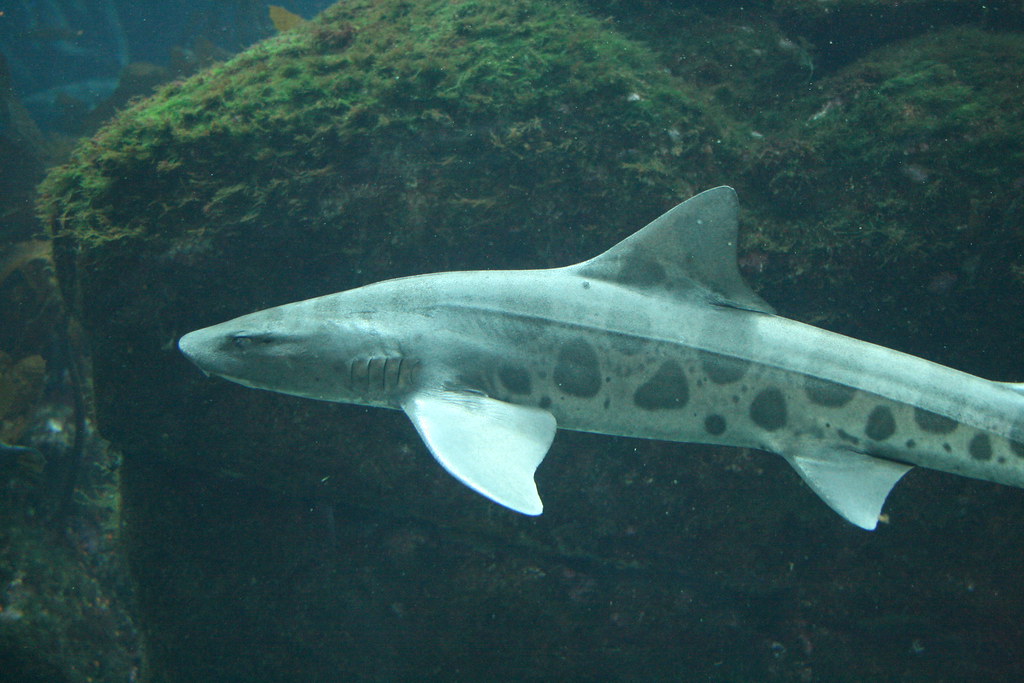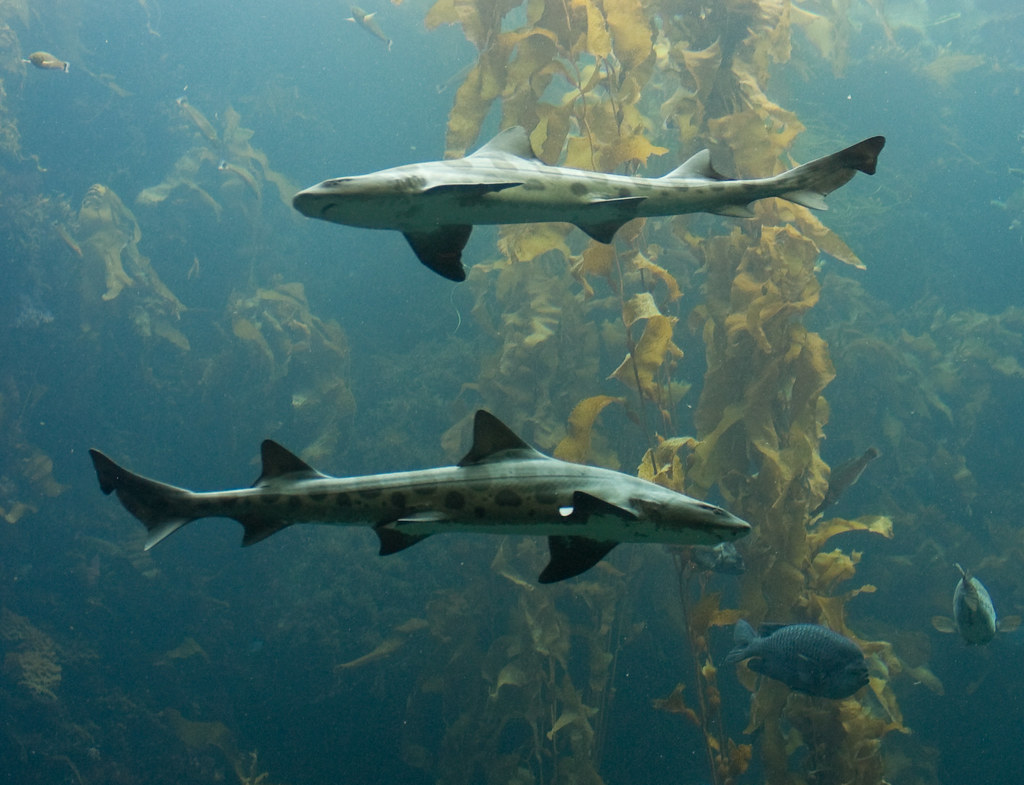.

Leopard Sharks are beautiful, undulating shallow water swimmers with lovely variegated-colour dorsal pattern markings, common and familiar along the California coast. They are eight inches long at birth and rarely grow to more than four feet in length at maturity. If they are able to escape fishermen, they can live to thirty, even forty years. Despite their dangerous-sounding name, they present no threat to humans. (There is a single record from 1955 of a leopard shark harassing a skin diver, causing him to develop a nosebleed.) Leopard sharks mate in summer. Females give birth the following spring. On the northern California coast, bays, sloughs and lagoons offer protected breeding areas. Females drop their pups in beds of eelgrass. The eelgrass provides both shelter and food. For some time the slowly-growing pups continue to forage in tidal flats and shallow coastal waters, possessing the uncanny ability to move out of enclosed areas just in advance of the retreat of the tide.
We lived for many years on a point above Duxbury Reef, a rock protrusion jutting out into the ocean from the Bolinas mesa. On summer's days we made small family expeditions onto the broad shallow tidal flats. Often there were young Leopard Sharks gliding in and out of the small pools created by the rocks. We waded among them without any sign on their part of recognising, much less minding, our presence.
Which was all a very long time ago; but in the way of pleasant memories, that one had remained fixed, "as if sempiternal..."
Until yesterday, that is, when my bravely seagoing partner of these several voyages hove dripping into view, ducking in from the latest wild pre-dawn rainsquall with the daily newspaper.
On the front page, under the top (so this is news?) stories -- latest breaking developments in sexual misconduct among the powerful and great of the anthropoid group, eighty percent of baby products contain or may contain toxic additives -- was this arresting headline: Excessive rainfall is possible killer of leopard sharks.
The story told of a Leopard Shark die-off -- when state officials "decline to use the term 'die-off'" you've got to worry that something's up -- caused by... too much rain.
From Kelly Zito's report:
This winter's heavy rains -- beneficial to so many species -- may, in fact, be diluting saltwater in San Francisco Bay so dramatically that leopard sharks are dying in the very spots where they prefer to give birth and search for food, scientists said Tuesday.
State biologists investigating a rash of leopard shark casualties around the region over the past month think the torrents of freshwater flowing into shoreline lagoons may be throwing the body chemistry of the fish fatally off balance.
"They might be going into these coves to pup," said Carrie Wilson, a marine biologist in Monterey with the California Department of Fish and Game. "If there's more freshwater intrusion and low salinity, it's very tough on these animals."
...hundreds of leopard sharks and rays also died in 2006, the last year rainfall was this far above normal.
More than 100 adult and juvenile leopard sharks have been found dead since mid-April... several scientists and members of the public have reported seeing the animals gasping and thrashing before death, suggesting the sharks could have injured themselves after falling ill.
The first wave of sharks washed ashore near a residential neighborhood in Redwood City. Since then, dozens of the strikingly patterned bottom-feeders have been spotted along the shores of Foster City, San Francisco and Marin County, according to Sean Van Sommeran of the Pelagic Shark Research Foundation.
Longtime East Bay resident Corky Schweizer observed a shriveled adult leopard shark carcass just south of San Francisco Airport on Saturday morning. He said the animal's remains caught his attention because they were so far above the waterline.
"It basically looked like it had launched itself out of the water," Schweizer said...
Though they don't venture out into the deep sea, [leopard sharks] do favor water with salinity levels at the higher end of the spectrum, said Wes Dowd, a postdoctoral scholar at Stanford University's Hopkins Marine Station in Pacific Grove.
Dowd studied the effect of low-salinity water on leopard sharks as part of his thesis. In his experiments, Dowd found that when salinity fell to 19 parts per thousand, the sharks thrust their noses and fins out of the water in an attempt to survive.
Earlier this spring, sensors in some parts of San Francisco Bay recorded salinity levels below 15 parts per thousand, Dowd said. Seawater salinity maxes out at about 34 or 35 parts per thousand.
"When (salinity) moves lower ... it becomes harder for the sharks to compensate for that change in their environment," Dowd said. "They don't cope well."
Though Wilson acknowledges the possible link between the deaths and the rapid influx of freshwater, she declined to use the term "die-off"...
Whatever the roots of the problem, shark specialist Van Sommeran suspects that he and his team of volunteers are collecting only a fraction of the ailing animals.
"We found 50 (sharks) in one canal in Redwood City alone," he said. "Now we're getting calls from Millbrae, San Francisco, Mill Valley, Sausalito -- it seems that the affected area is expanding."
San Francisco Chronicle, 18 May 2011

Leopard Shark (Triakis semifasciata) swimming in a kelp forest, Scripps Aquarium, La Jolla: photo by npzo, 23 August 2008 f

Leopard Sharks (Triakis semifasciata) cross paths in the kelp forest tank, Monterey Bay Aquarium: photo by npzo, 23 August 2008


Young Leopard Shark (Triakis semifasciata) foraging in shallow coastal tide flat near San Diego: photo by Sung Sook, 10 November 2007




6 comments:
There do exist photos of the stranded, thrashing sharks ...not happy-making to view, and one lacked the heart to post them, while at the same time recognising, the truth is the truth, and there are always those who would wish to learn by seeing it.
It would be nice to see this piece appear as an adjunct to Ms. Zito's piece in an updated edition of the Chronicle, in print and online (where the photos you've chosen would bring the story literally to light). So sad. Around Orange County, New York our non-predatory, but still hysterically perceived threat, is the black bear. Again, a single (tragic, but easily explained) incident of unfortunate bear-human interaction (i.e., worse than a nosebleed) in a hundred years. As for Dominique Strauss-Kahn, things seem to get clearer and stranger at the same time. I've read certain news stories that seem to defy any normal editing rules in that they contain (without comment or acknowledgement by the reporter) numerous unsourced, contradictory and irreconcilable statements. Watching Washington DC-based tv news pundits, who certainly both know him and until last week sought to curry favor with him, struggle to figure out their new affect, is making me dizzy. "Die-off" -- what will they think of next?
Tom,
Thanks for bringing us this sad news, otherwise not known, and for memories of "small family expeditions onto the broad shallow tidal flats" of Duxbury Reef (which kindle such memories of my own). . . . As for "die-off," as Curtis says, "what will they think of next?" Poor leopard sharks. . . .
5.19
light coming into sky above still black
ridge, white circle of moon by branches
in foreground, wave sounding in channel
sense of retrospect, is that
one present pass away
that is to say, disappearing
from, but will see it
silver of sunlight reflected in channel,
wingspan of cormorant flapping above it
Curtis,
Grizzly Bears have a sad, sad history in these parts. (The common U. of California employee answering-machine message excitedly urging, "Go Bears!!" has always rung curiously in my probably warped ears.)
However at least the Leopard Shark has managed to avoid adoption as mascot or icon by any sporting teams that I know of.
Steve,
Yes, perhaps you and Johnny have seen the Leopard Sharks, in that same place.
Then again...
sense of retrospect, is that
one present pass away
that is to say, disappearing
Tom, thanks for alerting us to this and for the beautifully articulated memories. When I was a boy staying at my grandma's down the Jersey shore, I used to bait a hook with a piece of white bread and tie it to a string and fish through the holes in the jetty nearest her place. I'd catch all kinds of smaller fish that liked to hover beneath the rocks. Of course, only one or two a fishing expedition. Then take them home and clean them and cook them for her and me. Most of those fish people don't even know about any more, like one we called something that sounded to my ten-year-old ears like Bacall (as in Lauren). I have no idea what happened to them, but the beaches now and then littered with debris from hospitals (needles, used bandages, etc.) might explain it. Thanks again, as always.
Lals, we'll probably never rank among the big league fishin' 'n huntin' bards. (This may be just as well.) My own youthful experience in this department probably parallels yours, transferred to the Midwest. The irregular brief vacation trips with family... my grandfather sometimes took a week's rental on a little place in a nowhere burg with wooden boards for sidewalks and a large silver globular water tower overlooking a tiny lake with water slides & c. There was fishing out of a rowboat. My major and perhaps only catch, some sad looking bluegills which probably should have been thrown back. Instead they were fried in a pan and et.
Post a Comment